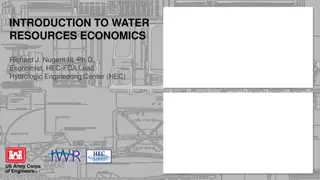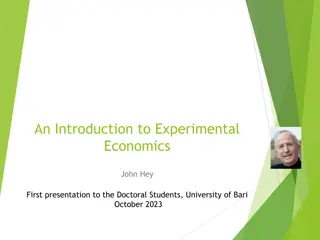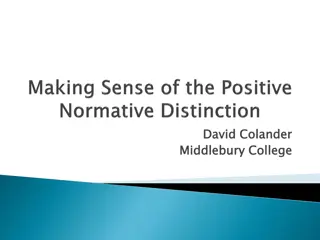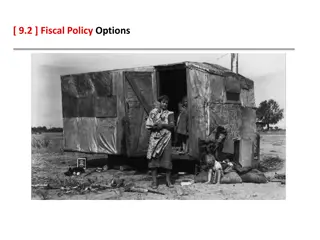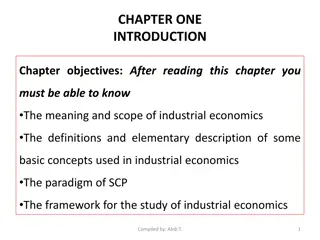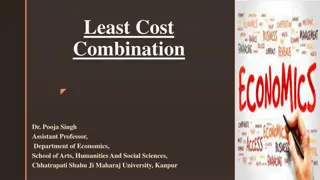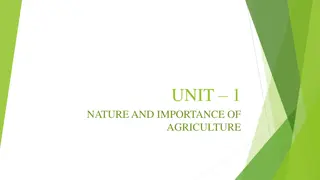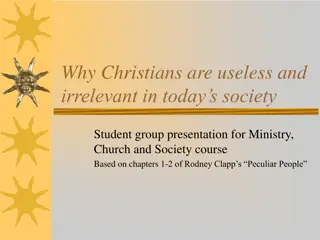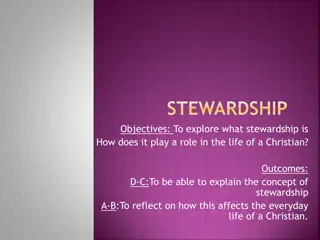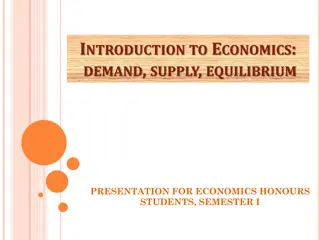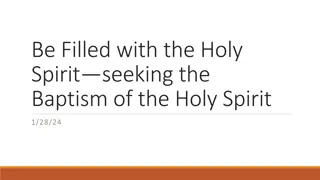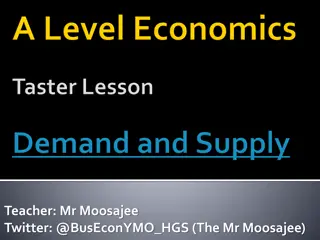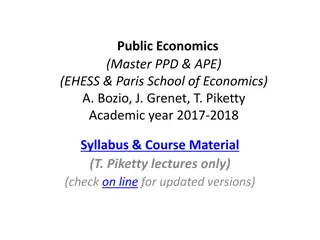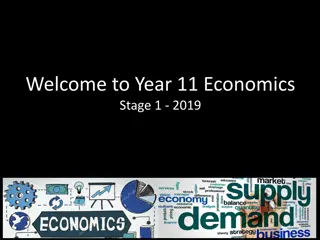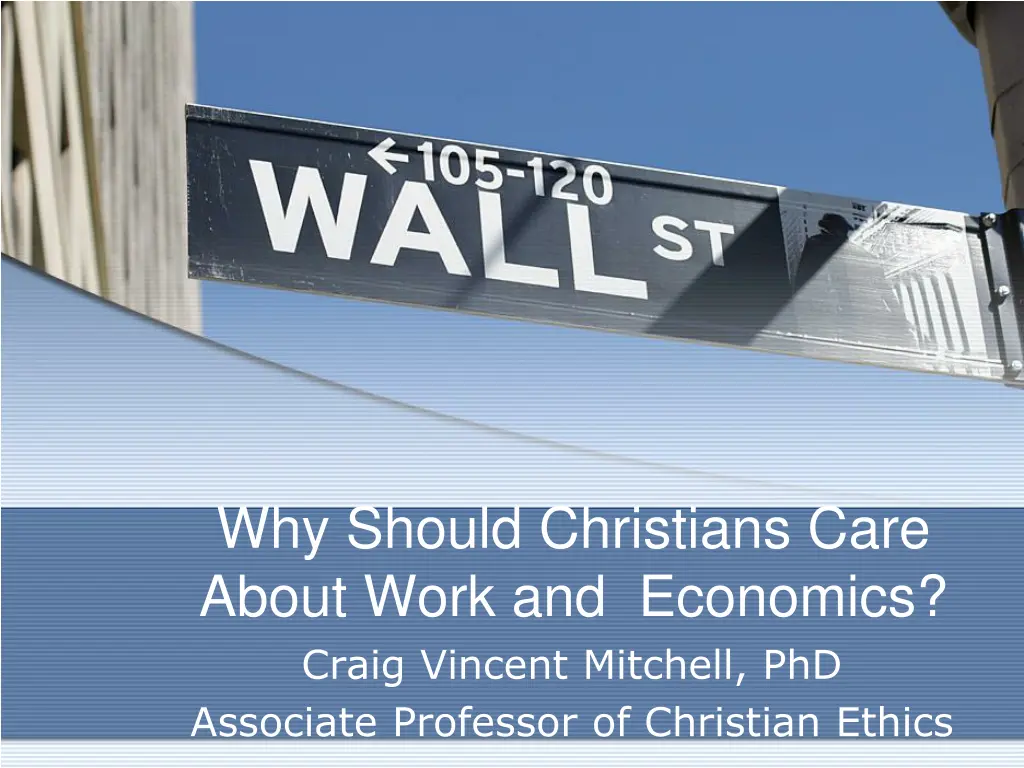
Christian Perspectives on Work, Economics, and Ethics
Explore the intersection of Christianity and economics, understanding why Christians should care about work, macroeconomic questions, taxation, the nature of economics, and the biblical principles guiding economic thought. Discover insights on wealth, virtue, and the divine economy in this insightful discussion by Dr. Craig Vincent Mitchell.
Uploaded on | 0 Views
Download Presentation

Please find below an Image/Link to download the presentation.
The content on the website is provided AS IS for your information and personal use only. It may not be sold, licensed, or shared on other websites without obtaining consent from the author. If you encounter any issues during the download, it is possible that the publisher has removed the file from their server.
You are allowed to download the files provided on this website for personal or commercial use, subject to the condition that they are used lawfully. All files are the property of their respective owners.
The content on the website is provided AS IS for your information and personal use only. It may not be sold, licensed, or shared on other websites without obtaining consent from the author.
E N D
Presentation Transcript
Why Should Christians Care About Work and Economics? Craig Vincent Mitchell, PhD Associate Professor of Christian Ethics
Reasons that Economics does not Matter Shouldn t we be concerned about eternal things rather than temporal wealth? Economics is only about business I don t have any money Economics have no effect on me God doesn t care about such things Economics are amoral
Macroeconomic Questions Is high unemployment a good state of affairs? Is high inflation desirable? Is low or no economic growth a good thing? If you answered no to any of these questions, then economics is important
Taxation Questions Should the government redistribute wealth? Should the government tax all of us equally? How much should the government take from people. Are there things that the government must spend money on? Are some things the government spends on that are only luxuries? How do we decide which is which? Should everyone have to work?
The Nature of Economics Economics is a social science that is concerned with the allocation of scarce resources. Economics is concerned with choices Economics is the most empirical and mathematical of the social sciences: sociology, political science Economics has plenty of applications to politics and business
The Bible and Economic Thought Thou shalt not steal implies property rights Buying and selling are legitimate activities Weights and measures used in markets should be righteous or accurate The Bible encourages work to gain wealth The government is allowed to tax, but there is no endorsement of government based redistribution of wealth in the Bible Wisdom literature teaches that wealth is gained by virtue, and poverty results from vice.
Oikonomia- Divine Economy The stoic philosophers came to speak of a management of the universe_ God s household management of the world, if you please. In the orderly arrangement of all things, each person has his or her own place within this administration, under the Master of the house. John Reumann, Stewardship and the Economy of God (Grand rapids: Eerdman s , 1992), 24
Oikonomia- Divine Economy Early Christians of the post- New Testament period inherited from Stoicism and Greek thought generally the idea of a divine economy. The New Testament references, especially in Paul, encouraged them (the Church) to think of an oikonomia of God, of which the apostles, church leaders and all Christians might be a part. All could think of themselves as oikonomoi stewards or administrators of God s saving plan. Latin- dispensatio Reuman, 26.
Oikonomia- Divine Economy Oikonomia Creation Redemption
Oikonomia- Divine Economy Reumann. 121 Creation Redemption There is a stewardship based on redemption, the gospel, God s saving righteousness, our response, and love to God, in ecclesial community. This endeavor comes from having received the Life of God s new age. There is a stewardship based on creation, justice, self-interest, creaturely concerns, self-love and involvement. This endeavor is part of receiving life and being human at it s fullest.
Christian Worldview Oikonomia Political Economy: State Work: Household Stewardship: Church
Christian Worldview: Work God Individual Family
Christian Worldview: Work Brother Lawrence wrote Practicing the Presence of God, it was published in 1693. He wrote, One must serve God in a holy liberty and do one s work without distress or anxiety, calling the soul gently and quietly back to God so soon as we find it drawn away from Him
Christian Worldview: Work Martin Luther believed that vocational calling extended beyond just theGospel ministry. He believed that God gifts men to do different kinds of work and that they should glorify Him in their work
Christian Worldview: Stewardship God Individual Church
Christian Worldview: Stewardship Baptist Faith and Message XIII. Stewardship God is the source of all blessings, temporal and spiritual; all that we have and are we owe to Him. Christians have a spiritual debtorship to the whole world, a holy trusteeship in the gospel, and a binding stewardship in their possessions. They are therefore under obligation to serve Him with their time, talents, and material possessions; and should recognize all these as entrusted to them to use for the glory of God and for helping others. According to the Scriptures, Christians should contribute of their means cheerfully, regularly, systematically, proportionately, and liberally for the advancement of the Redeemer's cause on earth.
Christian Worldview: Political Economy God Political Economy State
The History of Economics The first person to write on the subject of economics was Aristotle. Aristotle wrote The Politics and The Economics Aristotle understood that politics and economics are different aspects of moral philosophy
The History of Economics While Aristotle thought little of merchants, he understood that they served an important role Aristotle believed in free trade and free markets Aristotle believed that governments should not spend more than they take in
The History of Economics Augustine of Hippo wrote about economic theory in his City of God. His theory of personal distribution explains how the tradesmen serves their customers and their families
The History of Economics Augustine s theory of personal distribution explains how people are motivated by self love and by the love for his neighbor The tradesman loves his customers with benevolence (wishing good to them) and not with beneficence because of scarcity. The tradesman loves his family with both benevolence and beneficence (doing good to them). The tradesman sells his product to customers to earn the means to provide for himself and his family.
The History of Economics Aquinas combined the theology of Augustine with the philosophy of Aristotle Aquinas wrote a commentary on Aristotle s Politics and developed a Christian view on political economy. Aquinas work led to the founding of the Salamanca School of Economics further
The History of Economics 14thcentury Medieval Christian scholars developed economic theory after studying Thomas Aquinas commentary on Aristotle s Politics. They understood that God ordered everything and that economics is an ethical discipline They also believed that governments should do certain things and refrain from doing other things if the common good was to be served.
The History of Economics Francisco de Vitoria started the Salamanca School of Economics at the University of Salamanca, Spain. It was started by the Dominican Order They argued for the importance of free markets and against government intervention in the economy
The History of Economics The Salamanca school of economics extended to the University of Coimbra, Portugal. The Dominicans were joined by the Franciscans as well as the Jesuits in the development of free market economics
The History of Economics Frances Hutchinson was a professor of Moral Philosophy at the University of Glasgow (Scotland) He was also a Presbyterian minister. He developed the concept of the division of labor
The History of Economics Adam Smith was a student of Francis Hutchinson He was also a professor of Moral Philosophy at the University of Glasgow He wrote The Wealth of Nations
The History of Economics Adam Smith believed that a free market economy with a laissez faire government was the system that best promoted virtue and minimized vice. In this kind of system those who exercise virtues are most likely to prosper. Those who are vicious are most likely to end up in poverty
The History of Economics Adam Smith believed that government should ensure that the marketplace was a level plying field by punishing fraud Government should allow free trade between nations Governments should only spend money on public works, national defense, and a judicial/ legal system.
The History of Economics Karl Marx Friedrich Engels
The History of Economics Marx and Engels wrote The Communist Manifesto and Das Kapital Theirs is an atheistic system based on metaphysical materialism They desired to get rid of private ownership and give the state the means of production Socialism is the halfway house in their goal of a worldwide system They endorsed a worldwide revolution to install their system
The History of Economics Fascism Communism Communism is worldwide socialism Examples include: USSR, Cuba, China Communist governments are often dictatorships Fascism is national socialism Fascism is only one step on the way to communism Examples include: Nazi Germany, Italy under Musolini Fascist governments are often dictatorships
The History of Economics Ludwig von Mises Friedrich von Hayek
The History of Economics Karl Menger started the Austrian School of Economics It is a free market approach to economics They more closely followed the ideas of the Salamanca School of Economics than Adam Smith did They believed that morality and economics are entwined Ludwig von Mises and Friedrich von Hayek both won the Nobel prize in economics
The History of Economics John Neville Keynes was a professor of political economy at Cambridge University He divided economics into positive, normative, and practical economics
The History of Economics John Maynard Keynes is the son of John Neville Keynes He wrote The General Theory of Employment , Interest and Money He invented the field of macroeconomics
The 20thCentury Debate in Economics John Maynard Keynes Keynes was a socialist Aggregate markets work differently from individual markets The government can control the economy by raising and lowering taxation and consumption The government should also control interest rates Markets are irrational He rejected Adam Smith Friedrich von Hayek Hayek hated socialism Market forces always operate in the same manner. Business cycles result from government intervention Markets work and governments do not Market forces result in spontaneous order, which is efficient Markets are rational
The 20thCentury Debate in Economics Keynesian economics reigned from the 1940s until the 1980s. Both Margaret Thatcher and Ronald Reagan were followers of Hayek and institutionalized his ideas. There was an economic boom from the 1980s until 2008. Both George Bush and Barack Obama brought Keynes ideas back into vogue.
Explaining the Economic Disaster Market Failure Asymmetrical Information Externalities
Explaining the Economic Disaster Asymmetrical Information Adverse Selection Moral Hazard
Explaining the Economic Disaster The federal government forced banks to make loans to those without good credit (Community Re-investment Act and the Graham, Leach, Bliley Act of 1999) thereby forcing adverse selection. Fannie Mae and Freddie Mac (quasi- government agencies) made bad decisions AIG insured investors against default The government then bailed out banks that were too big to fail thereby engaging in moral hazard.
Results of the Economic Disaster Higher national debt (5 trillion increase since 2008) 16 trillion dollars total Higher unemployment (10.1 %) Slower economic growth Eventually inflation or deflation All of these things have a direct impact upon you and your local church!
Why Economics Matters In 1986 Blank and Blinder found that an increase in the unemployment rate for males of 1% increased the poverty rate by .7% Far fewer women than men are able to earn enough money to escape poverty. The poverty rate in 2007 was 12.5% of the population and rose to the present figure of 14.3% (43 million people)
Why Economics Matters Difficult times mean more opportunities for ministry Difficult times means less money for churches and denominations Difficult times means less money for missions Difficult times mean less money for seminaries We should pray that the Lord will empower us to do His work
Solutions: Socialism Socialism attempts to spread the wealth through redistribution. This redistribution takes the form of a progressive tax (the more you make, the more they take) Progressive taxes are another form of stealing Socialism reduces individual freedom and gives more power to the state
Solutions: Liberation Theologies Liberation theologies divide people into two groups, oppressors and the oppressed Christ is with the oppressed and against the oppressors The oppressors cannot know truth meaning or morality The oppressed should overthrow the oppressors and redistribute wealth in some kind of socialist scheme
Solutions: Free Market Economics This approach causes economic growth, so that everyone benefits It results in lower unemployment, lower inflation, and higher economic growth It increases individual freedom It reduces the number of people in poverty It is consistent with a biblical Christian worldview
Conclusions All economic policies are not of equal value Free markets work and governments don t Not all economic policies are consistent with a Christian worldview The Church has a traditional role of taking care of the poor, while preaching the Gospel Our work matters for our growth in Christ, as well as for our own wealth and poverty

